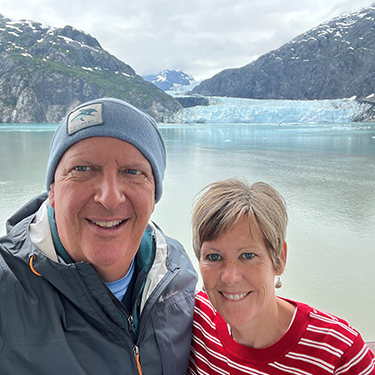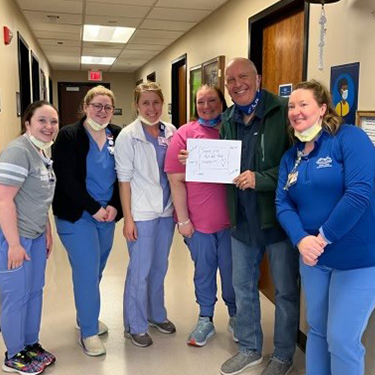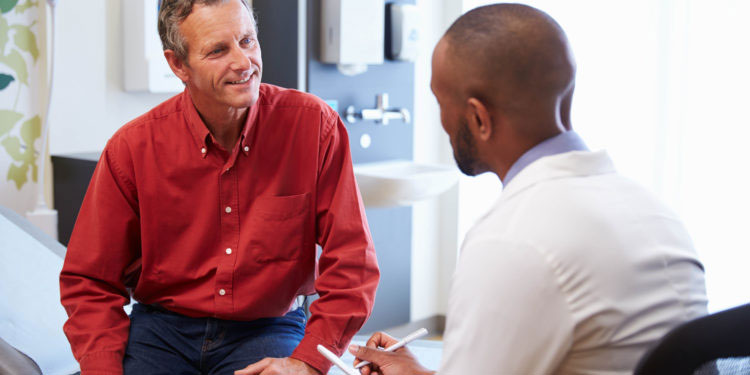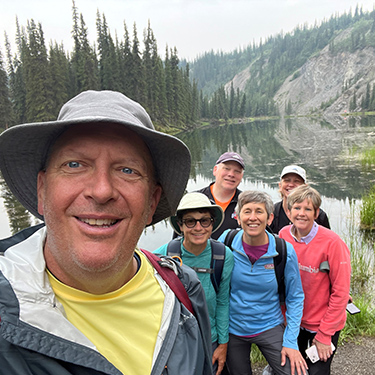Get Screened
Colorectal cancer screening is the best means to catch pre-cancerous polyps and diagnose colon cancer at its earliest stage, when it’s treatable and curable.
 On the tennis court at Milford High School, coach Rich Kynast is getting ready for a tournament with the girls’ varsity team. He’s a guy who just finished his own contest – and it wasn’t a game. Rich was on a team with Henry Ford cancer experts to wipe out life-threatening colon cancer that had spread to his liver and lungs. After 14 months of treatment, he celebrates that he’s cancer free.
On the tennis court at Milford High School, coach Rich Kynast is getting ready for a tournament with the girls’ varsity team. He’s a guy who just finished his own contest – and it wasn’t a game. Rich was on a team with Henry Ford cancer experts to wipe out life-threatening colon cancer that had spread to his liver and lungs. After 14 months of treatment, he celebrates that he’s cancer free.
Teaching U.S. history and German language for 30 years at Milford High, Rich was a healthy man who worked out for about 15 hours each week. When he had some surprising colorectal symptoms, they became a joke. But after a colonoscopy, he received a sobering diagnosis: stage 4A colon cancer. He hadn’t known that the most common colon cancer often doesn’t have any symptoms until it spreads to nearby organs, or the tumor grows large.
“It was a stunner,” says Rich, then 54. “My son is a physician, and we had an awful lot of clarity about what was going to happen.”
At Henry Ford Hospital in downtown Detroit, Rich and his wife met with medical oncologist Ira Wollner, M.D. and a special multidisciplinary cancer team.
“We got a positive and professional vibe from the doctors, and it infused a certain level of trust,” says Rich. “It wasn’t sunshine and rainbows. They were very honest about what I was up against. But everyone had that vibe: We’ve got you. We’ve got a plan. Let’s get to work.”
Our team of colon cancer experts work together to ensure you receive an accurate diagnosis and treatment plan based on your unique needs. Meet the Team.
 Treatment began with chemotherapy on alternate weeks for one year – not record-setting, but a lot. On Monday during chemo week, Rich had a large infusion then wore a pump until Wednesday and felt sick. Returning the pump, he’d feel OK by Thursday. Most Fridays and during no-chemo weeks, he’d teach school. Most weekends, he’d go out with his wife and friends or visit his two adult kids.
Treatment began with chemotherapy on alternate weeks for one year – not record-setting, but a lot. On Monday during chemo week, Rich had a large infusion then wore a pump until Wednesday and felt sick. Returning the pump, he’d feel OK by Thursday. Most Fridays and during no-chemo weeks, he’d teach school. Most weekends, he’d go out with his wife and friends or visit his two adult kids.
“You learn that you don’t let the weekend pass without doing something fun – that’s for sure!” says Rich, calling himself a glass-half-full type of person.
To check if the chemotherapy was effective, he would have a CT scan every eight weeks. “Seeing visible signs of improvement really helped,” says Rich. It also helped when he and his wife cruised to Alaska for a couple weeks midway through chemotherapy.
Next, Rich underwent a 10-hour surgery, combining two treatments. First, expert surgeon Shunji Nagai, M.D. used a laser to treat the liver tumor. Then specialized colorectal surgeon Megumi Asai, M.D. removed the cancer in his rectum, reattached his colon, and performed an ileostomy – creating an artificial opening in his abdomen.
We do a lot of complex abdominal and transrectal surgeries, and robotics make the surgeries easier, says Dr. Asai. “With new techniques and technologies, we’ve been very successful to avoid a permanent stoma for patients.”
“The doctors and nurses were always empathetic. With each treatment, it was a matter of getting used to a new reality,” says Rich, who used an ileostomy bag while his body healed.
One of the worst parts of the surgery was staying home and doing nothing for three months, says Rich. “I like to be busy – hike or play tennis, pickleball or bowl. But sitting and watching TV is not awesome!”
During the darkest times, his wife Angie, a high school chemistry teacher, was there for him. “She was my 24/7 support system,” says Rich. “My wife was the only person who was with me every single day, every single appointment, every single piece of the journey from diagnosis to recovery. On the nights when I was planning my memorial service, she’d talk with me. But on good days, we’d go and have fun.”
His adult children and his parents also helped. Friends planned meals. Colleagues sent encouraging messages. And the school arranged for a substitute teacher. “I was blessed to have wonderful people around me,” says Rich.
After his body healed, Rich had another surgery to reverse the stoma. “You learn how to use your body again,” says Rich. “ Now, different tissue is doing a job it wasn’t designed to do. There’s some retraining, but nothing debilitating. You’ve just got to pay attention.”

Colorectal cancer screening is the best means to catch pre-cancerous polyps and diagnose colon cancer at its earliest stage, when it’s treatable and curable.
Says Dr. Asai, “He’s always active physically and mentally, which helps recovery. He didn’t require a lot of pain medication, and his recovery was one of the best I’ve seen – even with advanced cancer.”
Cancer has changed Rich’s life. “There’s no way you don’t enter each day with a higher level of gratitude. When you get to do something you’re passionate about, like tennis or working with teens, you feel gratitude and try to express it,” says Rich.
“Now I have my old level of energy and enthusiasm for greeting each day. When you go back to doing normal things, it feels wonderful,” says Rich. “I feel like I’ve been given a fresh start. Through a combination of the doctors’ expertise and the way my body responded to treatment, here I am – cancer free.”
 Since colon cancer is the second leading cause of cancer deaths in the U.S., Dr. Asai strongly recommends a screening colonoscopy starting at age 45 – or sooner for people who have a family history of colon cancer or polyps. She warns that there is a genetic link to the disease. African American ethnicity, obesity, smoking, low-fiber diet, and eating lots of red meat and processed foods are associated with increased risk of colon cancer. Remember: Colon cancer symptoms may only appear when the disease has spread.
Since colon cancer is the second leading cause of cancer deaths in the U.S., Dr. Asai strongly recommends a screening colonoscopy starting at age 45 – or sooner for people who have a family history of colon cancer or polyps. She warns that there is a genetic link to the disease. African American ethnicity, obesity, smoking, low-fiber diet, and eating lots of red meat and processed foods are associated with increased risk of colon cancer. Remember: Colon cancer symptoms may only appear when the disease has spread.
Rich encourages patients to trust the experts and their treatments. Find support all around you, and when you have an opportunity to do something fun – do it!
We use cookies to improve your website experience. By using this site, you agree to our Terms of Use. Read our Internet Privacy Statement to learn what information we collect and how we use it.